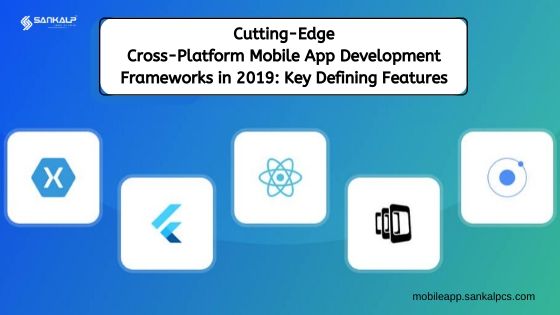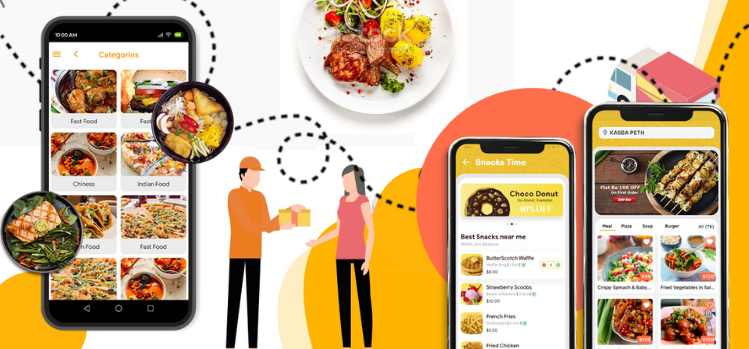The mobile revolution is reaching heights all over the globe. At the pinnacle of success are smartphones that permit you to get through everyday activities with diligence and ease. Apps allow easy booking of tickets, tracking of food orders, window-shopping through e-commerce, and a whole lot more. Mobile app developers can make it easier for smartphone apps by working on cross-platform apps over other app types. So, whether it’s an android app development or an iOS app development, customized apps built using cross-platform mobile app development frameworks can get you the best of both worlds.
Why Cross-Platform App Development Tools Work Well?
Organizations have been striving for the past decades to go digital. Now, in the mobile-first era, employee management of everyday affairs is through smartphone apps. Creating a mobile app is far more comfortable today. Cross-platform mobile app development has become mission-critical in the modern corporate ecosystem. As work-life divide blurs, working from any location is a reality. Infrastructure investment is also saved through the development of cross-platform mobile apps. The real problem is in integrating numerous devices and platforms like Windows, iOS, Android, etc. It is here that one needs cross-platform app development. A cross-platform app permits applications to function in multiple devices. Hybrid apps are developed with amazing mobile application development features. The process of mobile app development is rapid.

Additionally, progressive web apps and Windows universal apps also come into play. Cross-platform apps outsmart native apps in a lot of aspects. Here are the top 11 cross-platform mobile app development frameworks of 2019.
1. Ionic
Ionic mobile app development frameworks use HTML5 to create hybrid apps. These apps are better than native apps, when speed, support, and third-party access are considered. This is the best option if you have limited time to market the app. Native-type User Interface components and layouts on Android and iOS is another benefit of using the Ionic framework. It is an HTML5 framework that uses a wrapper to work as a native app.
2 Phone Gap
Apache Cordova or PhoneGap is a free cross-platform mobile app development build process framework. PhoneGap offers a FOSS environment for cross-platform mobile application development. It comprises a compiler, debugger, and tools for testing purposes. Critical web technologies include CSS3. JavaScript, HTML5, and a whole host more. PhoneGap also has plugin backups. It supports in-app purchases for iTunes and Google Play, and support from third-party cache and graphics accelerators can speed up apps.Further, a sturdy backend can assist beginners. As it is open-source, it can be shared. It’s also really flexible.
3 Appcelerator
This is yet another cross-platform development framework that can be used to deploy, develop, and test the functionality of mobile apps. It uses JavaScript as a universal code mechanism. The same code can be tried for apps on different platforms. It’s perfect for rapid app development. Appcelerator offers schema-less databases alongside ArrowDB for deploying data models with negligible setup efforts. It even offers pre-built integration with MS Azure, Salesforce, MS SQL, Box, and MongoDB. Newer versions take care of earlier speed and lag issues. The Titanium framework makes it exceptionally cost-effective. Cloud services can be used for packing, distributing, and examining. Fundamental source code is user-accessible at any time.
4 React Native
This is an open-source, cross-platform app development framework proposed by social media giant Facebook. It follows the learn once, writes everywhere maxim. JS is the base language, and it offers a chance for native functionality. Once coded, the app can be ported to Android and iOS using the same base code. The functionality helps React Native to stand apart, even in the event of cross-platform apps. Platforms have a look and feel of a native app, offering an interactive user experience. This is an emerging framework that ensures quick prototyping and high initial velocity. It is easy to learn the basics.
5 Native Script
Native Script is equivalent to writing native apps using cross-platform capacity in JS, Angular, or TypeScript. This is the most preferred app development framework for trending micro-apps. Such apps perform precise functions focusing on single features. Runtimes, core modules, plugins, and CLI allow easy application development.
6 Flutter
Flutter refers to a fast, dynamic mobile app development. The hot reload works by putting in source code files into the DVM/Dart Virtual Machine. This makes it easy to rebuild the widget tree by making it easy to see change effects. The widget provides features such as icons, scrolling, fonts, and navigation to launch full-fledged iOS and Android apps. Flutter is a react framework type tool with 2-D rendering, widgets, or tools. This helps to design, test, build, and debug apps easily.
7 Xamarin
This app provides an inclusive cross-platform development for desktops, tablets, and mobiles. Android and iOS quick start helps in building native UI components. Xamarin supports languages like the Razor template engine. C# and F# may also be supported. Microsoft acquired Xamarin and later released the SDK. Such a native friendly interface empowers developers to respond to certain client demands. This is a one-size-fits-all program with HTML tools to help end-users and developers.
8 Felgo
Felgo is another cross-platform SDK working on the Qt framework, which is the famous C++ structure, widely deployed by developers. Felgo uses this Qt core with an app and game elements. Plugin apps for purchases analytical tools, etc., make this a standalone platform. Felgo is the growing cross-platform mobile app development framework. It is well known among a new generation of developers. Features make it super attractive.
9 Rho Mobile
RhoMobile offers a Ruby-based OSS Rhodes, which works seamlessly with Windows Mobile, RIM, iPhone, and Android besides Symbian. Ruby is a popular programming language. RhoMobile also empowers a hosted development environment for developers to code apps called RhoHub. Then, there’s RhoSync, an independent service to store app data and update it on user devices. Native apps spread across platforms using a single code. Native apps work well with the hardware. Work gets done faster and easier with this cross-platform mobile app development framework.
10 Kony Mobile Platform
This mobile platform provides essential functionalities for universal apps. The channel-specific APIs, third-party libraries use Foreign Function Interface, forming its specialty. The One Server app server enables offline syncing, security device detection for mobile-first content, push notifications, and SMS. The Kony Visualizer powers front end with multi-channel JS API frameworks, assisting designers and developers to deliver an array of services to tablets, smartphones, and desktops on iOS, Windows, Blackberry, and Android.
11. Sencha
Sencha’s ExtJS is like the React Native as far as functionality goes. A critical factor differentiating them is the use of the Ext JS development framework. Sencha offers a visual app builder for HTML (hypertext markup language)5. There is also the reusability of customized components. Native app packagers manage distribution to iTunes and Play Store.
As it uses HTML5 for development, apps can be tested and run on browsers and mobile apps. It is also compatible with differing cross-platform tools like PhoneGap for functional apps.
Conclusion
Cross-platform apps are a turning point in the mobile app development field. Internet revolutions demand businesses to have an online presence. A lot more entrepreneurs are transitioning their business online. The key is to engage with stunning cross-platform apps. Sankalp offers specialized apps, customized to suit your needs, using the #1 mobile app development framework Ionic. At Sankalp, apps breathe life into your business and meet company requirements. With a rich experience of over two decades, Sankalp has pioneered many cutting-edge apps. Be part of the Sankalp experience and grow your business.







cheers a lot this website can be official plus informal
Hi there, I enjoy reading all of your article posts.
Pretty great post. I simply stumbled upon your weblog and wished to mention that I have really loved surfing around your blog posts. In any case, I’ll be subscribing to your RSS feed and I’m
hoping you write once more soon!
cheers a good deal this amazing site is professional and
casual
You have made some decent points there. I looked on the web to learn more
about the issue and found most people will go along with your views on this web site.
Truly….such a handy website.
This is really interesting, You are a very skilled blogger. I have joined your RSS feed and look forward to seeking more of your great post. Also, I have shared your website on my social networks!
I do agree with all the concepts you have presented in your post.
They’re very convincing and can definitely work. Nonetheless,
the posts are too quick for beginners. Could you please lengthen them a little from subsequent time?
Thanks for the post.
I visit every day some web sites and information sites to read articles, however, this website offers quality based
writing.
I have been exploring for a bit for any high-quality articles or blog posts on this sort of space
. Exploring Yahoo I finally stumbled upon this site.
Studying this info So I’m glad to exhibit that
I have a very just right uncanny feeling I came upon exactly what I needed. I so much definitely will make sure to don’t disregard this website and provides it a look on a constant basis.